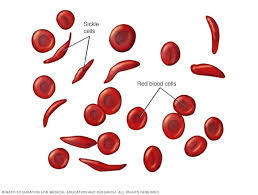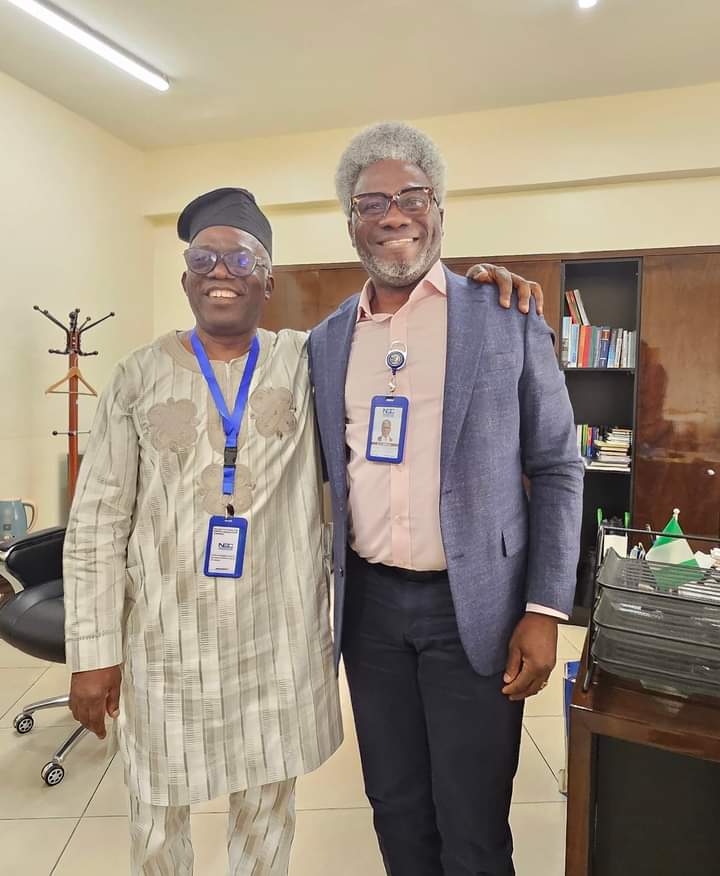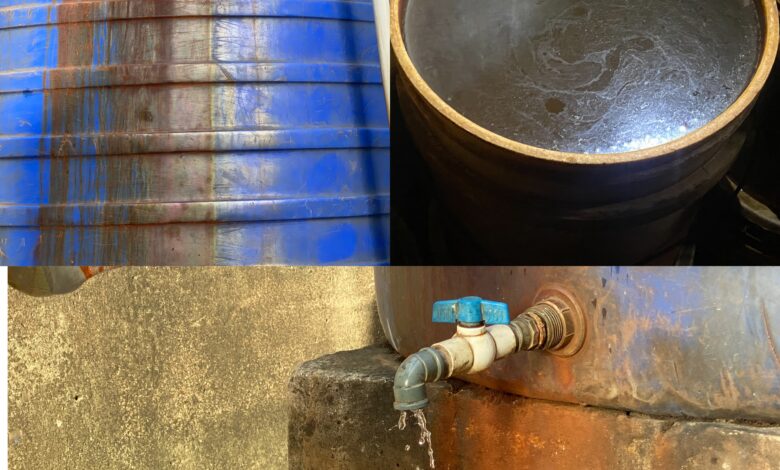
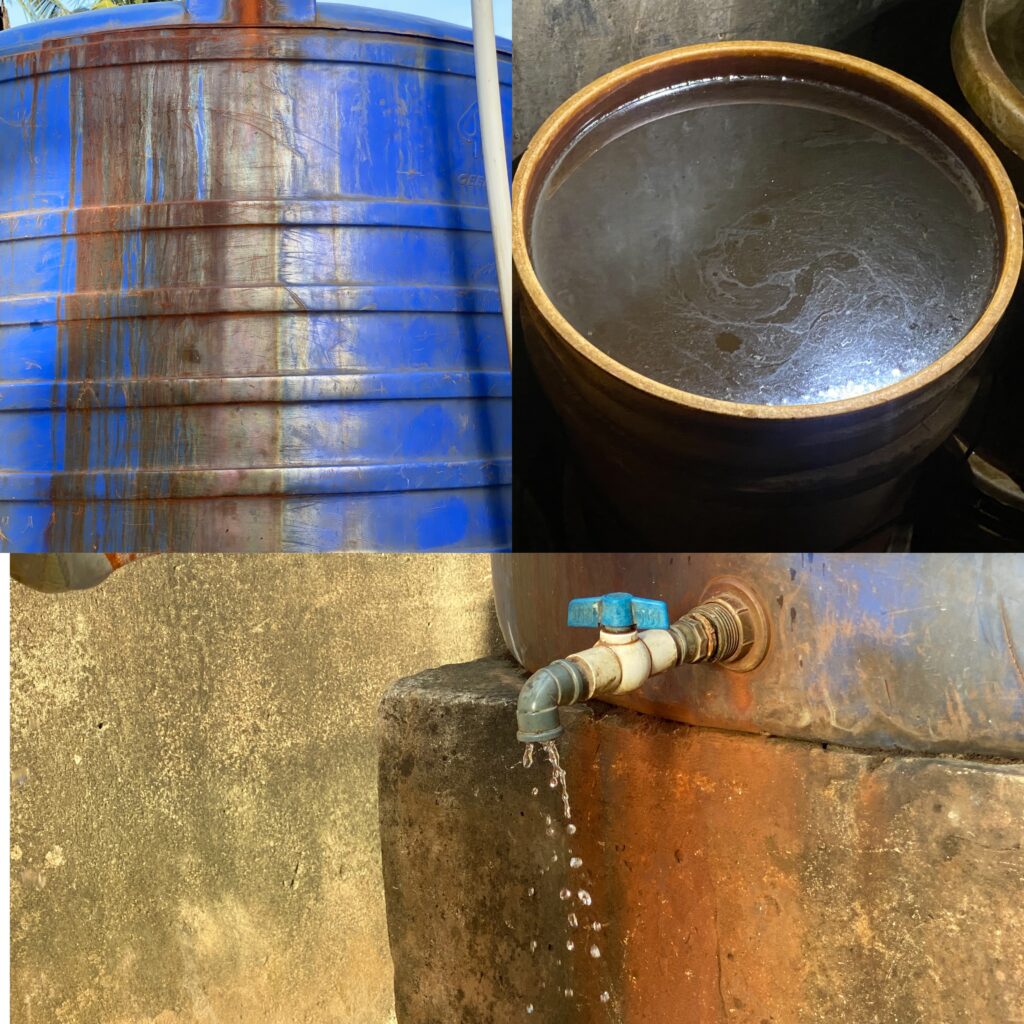
-Residents suffer 9 years of foul water
Community blame Lagos Govt, Construction company for water woes
By Samuel Ogunsona
Though Nigeria, the West African country boasts as the “Giant of Africa” while the country’s commercial hub, Lagos, price herself as the fifth largest African economy, some residents in the community live literally in the 18th century in the context of access to good water.
With some 200 million people, Lagos takes the lion share with 18m residents in the State.
A first time vistor will be impressed by Lagos on face value. High rise dot the city’s vast cloud, bridges network, the coastal with the mainland territories, with many industries and fast food outlets amidst modern roads.. Presidents of Nigeria actually lived in the city until 1992 before the capital was moved to Abuja.
The curse of oil
Nigeria after the fall of Libya, topped Africa’s oil producing countries, sometimes coming first or second with a potential of 2million barrels of oil per day, though Nigeria hardly meets the Organisation of the Petroleum Exporting Countries (OPEC) quota.
Water and livelihood in Lagos: The travails of Iludun Community
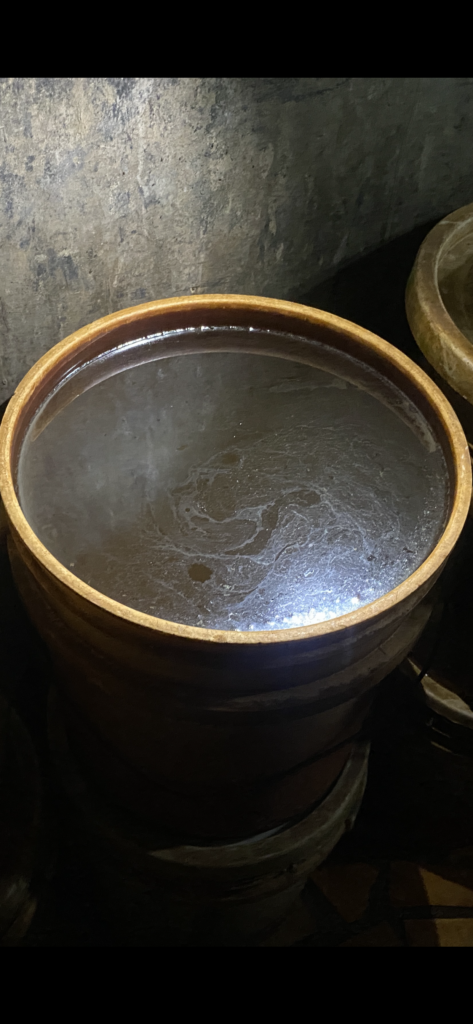
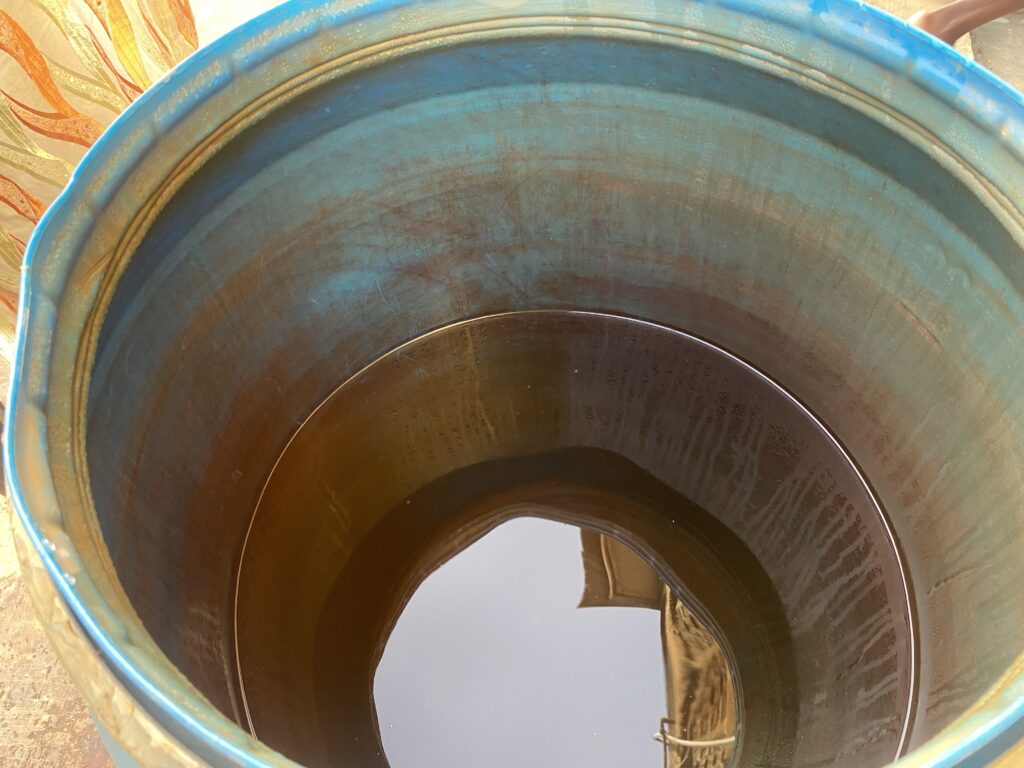
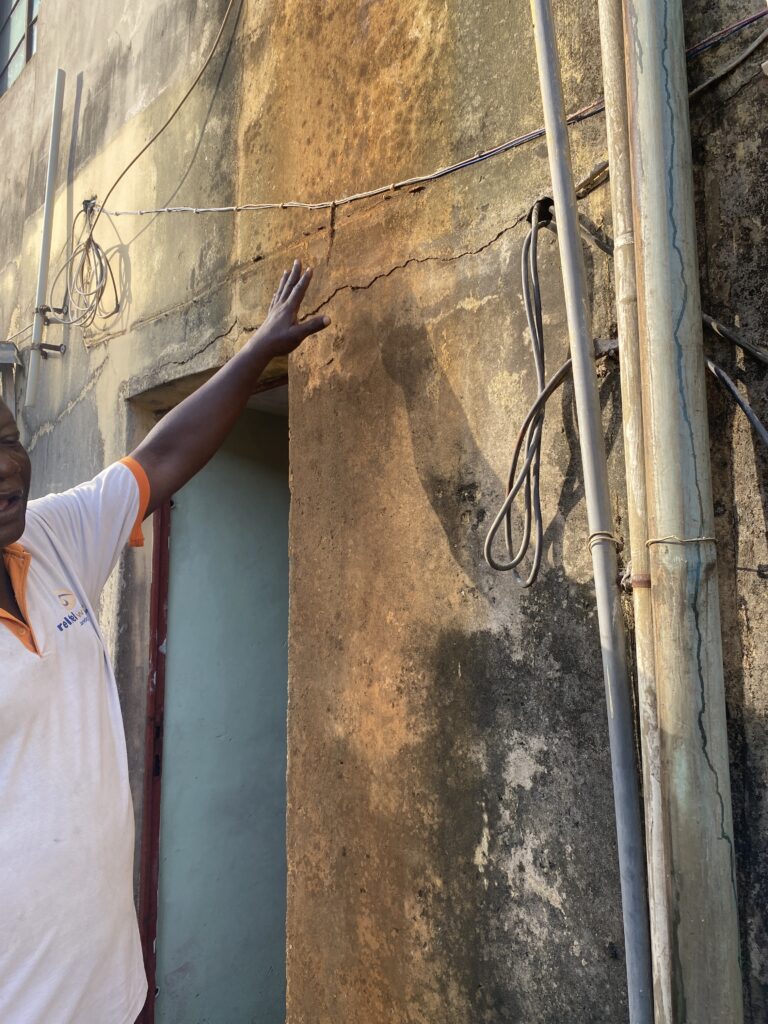
Drinkable water, that most essential commodity is as scarce as gold in Lagos, Nigeria’s commercial nerve centre. A visit to Iludun community in Lagos typifies the travails of many rural communities in Lagos who live at the mercy of heavily polluted water and risk death loitering around them.
Half naked children ran up and down, some nursing mothers had their children strapped on their shoulders, makeshift building and shanties dot the vast space.
Some little children were seen bathing in the stagnant pool that stank. From afar, a visitor could smell the strong odour of human waste mixed with oil chemicals. Planks serve as the link from one shanty to the other. poverty and misery was boldly written in the horizon.
“Good water to drink is one of the most difficult things to source in Lagos” says Mr Tunji Abiodun and official of Green Peoples Environmental Network, (GREPNET) told our reporter.
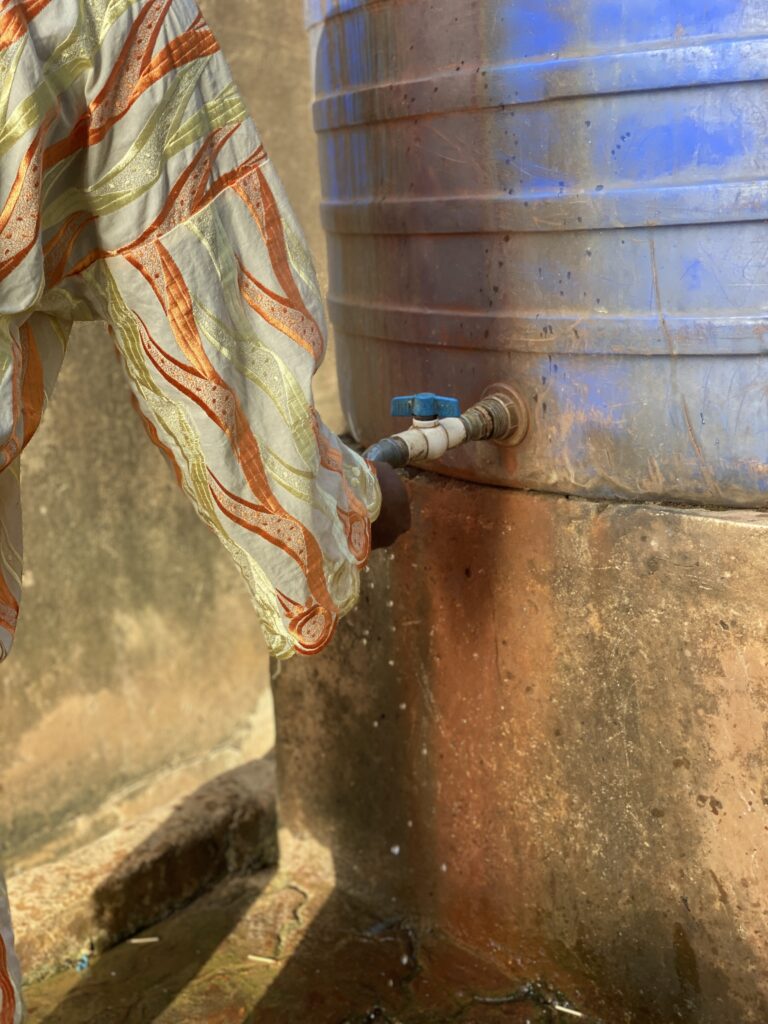
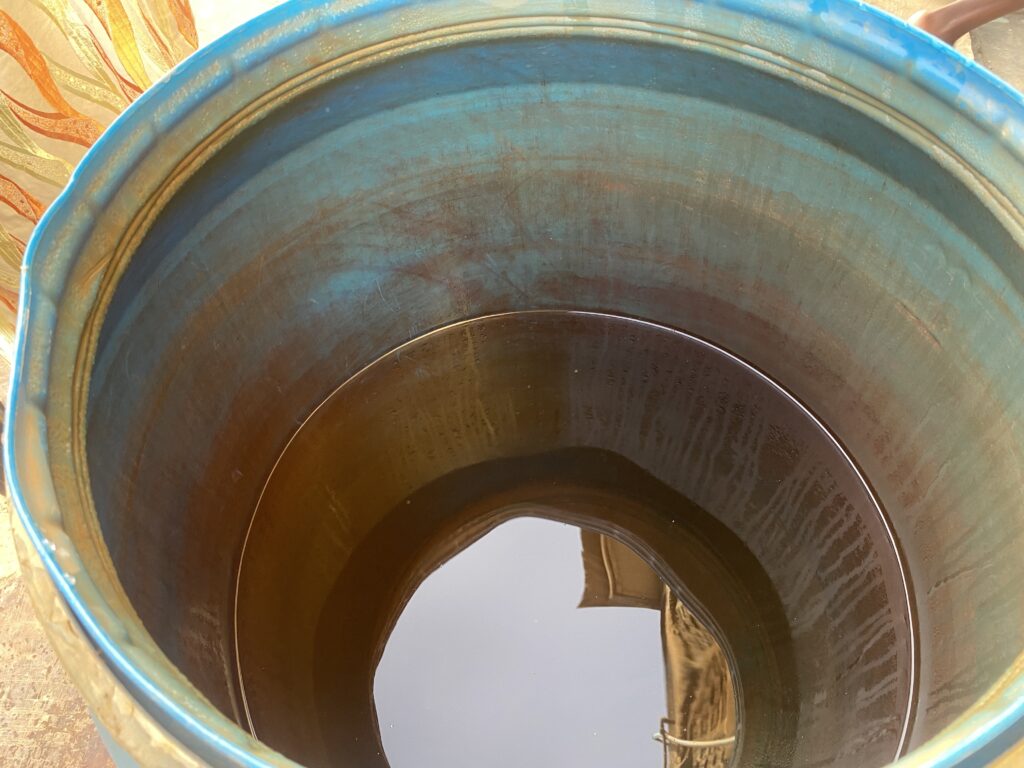
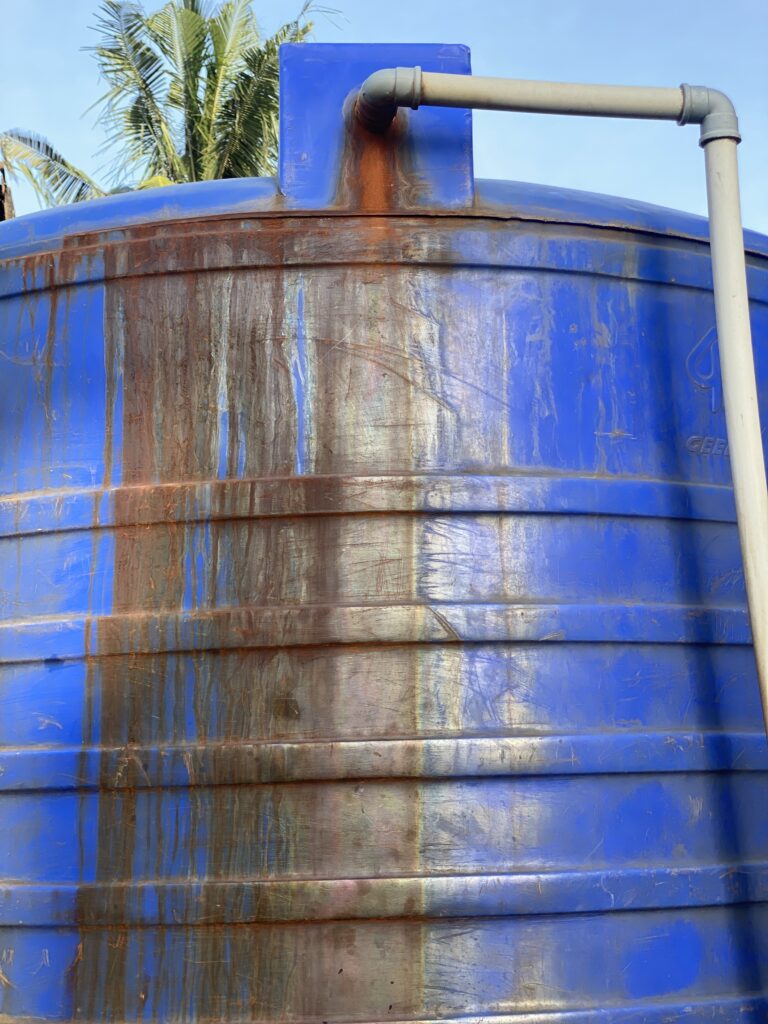
He said though Lagos has the second longest coastline in Nigeria, with vast water resources, residents of Lagos rural communities continued to be denied access to good water to drink.
He said the situation has brought misery and death to several people including women and children who live on the fringe of the historic city.
He said the other natural water available to most rural residents are vulnerable to poison from human economic activities.
He lamented that the nation on the other hand has suffered terrible oil spills from underground pipelines which may have contributed to deaths and destruction.
Farmers and fishermen and women, in Lagos, he said are not left out from the menace.
“There is a major crisis relating to poisoned nature in Lagos. Farmlands polution, destruction of fishing affect the ecosystem and make life unbearable for Lagos residents especially rural Lagos dwellers” he said.
An official of Nigerian Human Rights Community, (NHRC), Mr Taiwo Adeleye said.
He argued that the “scourged environment in Lagos” affects natural waters and leads to several health problems.
Though not too far from them are a long stretch of sprawling highbrow magnificient buildings, rural dwellers in Lekki area of Lagos are direct victims of the water crisis in Lagos.
A visit by our correspondent to this community speaks of gory tales of tears, anguish and blood. Without hygienic water, residents resort to putrid water, algae infested and sometimes filled with the stench of animal and plant remains combined with industrial waste washed down to the communities during the raining reasons.
Residents who spoke with our reporter said death and misery have been their most consistent companions.
“My 3-year children suffered throat infection” says Andrew Nkem, a resident who has been living in the community for more than 36-years.
Genesis of the Pollution
Iludun community, Lagos – It all started nine years ago when a resident in the community took from his bore hole water and discovered there an unusual coloration on the surface of the water which also smells like gasoline.
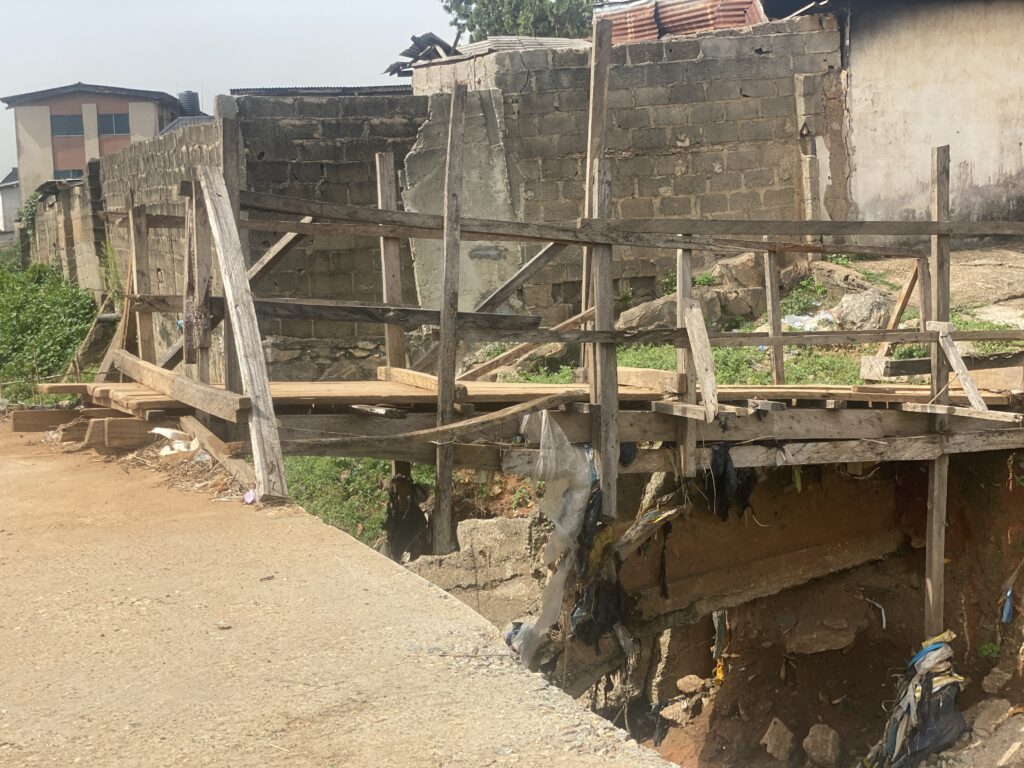
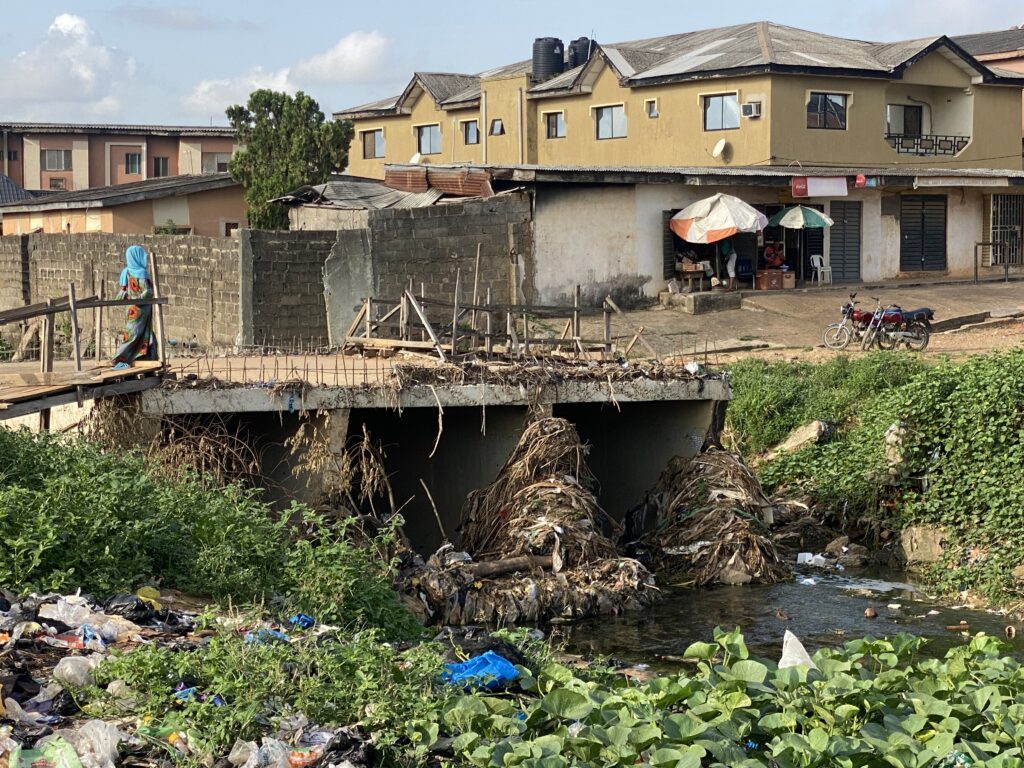
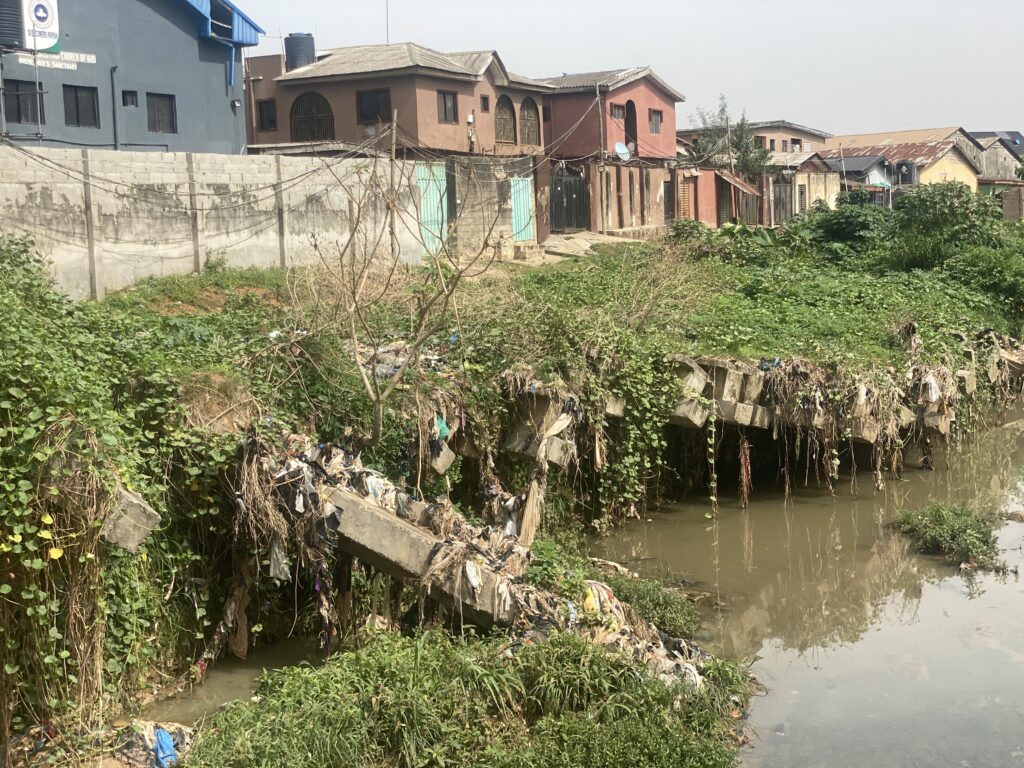
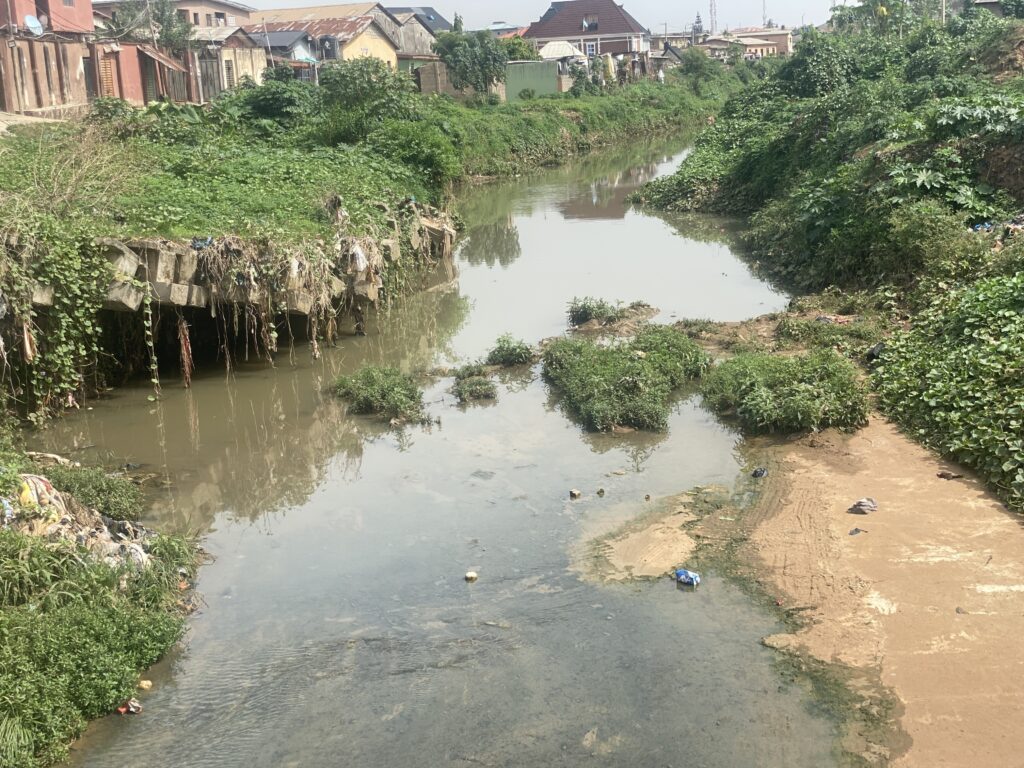
Indications that the residential water had been polluted surfaced in 2015, at the time the Lagos State Government awarded a bridge contract to a construction company, Niran Badmus Limited, residents told our reporter.
Pastor Felix Kupolusi, the current chairman of Iludun community, with other stakeholders in the community who investigated the source of pollution said the Niran Badmus contractors without proper inspection/consultation from the community leaders bursted one of the underground pipelines in the process of the bridge project.
“So the contract was awarded by Lagos State Government in 2015. The name of the company is Niran Badmus limited.
“I think before construction started, there should be a consultant, and the work of the consultant should be to carry out an investigation of everything that we make the contract workable.”
He said there was neither community nor Environmental Impact Assessment (EIA) by the construction company.
“If there is going to be a hindrance or anything whatsoever. It is the duty of the consultant to tell them and what to do” Ikupolusi explained.
He said to give confidence to the people, there should have been constructive engagement of the indigenous residents but that was not done.
He said “First and foremost, we expected you to have carried out soil investigation. That soil investigation will determine the kind of foundation you’re going to construct in that particular place.
“And if you have to carry out such a heavy construction, you must consider the pipeline area. Perhaps you get some drawing. You let the engineer to assist you to protect the pipelines. So by the time you are inserting your pillars, you will not get in contact with what you have underground.”
He said to the surprise of the community, the contractor did not consult anybody in the community but got there and messed up everything by polluting the whole environment including the natural water source.
Government Negligence
The community has been fighting for a safe water. Residents explained how the Lagos State government has failed them.
Pastor Ikupolusi said from their findings, the state government has decided to neglect the community after writing several letters to the government without even the courtesy of acknowledgement.
He said, “Since 2015, We have written several letters to the construction company. They ignored us.”
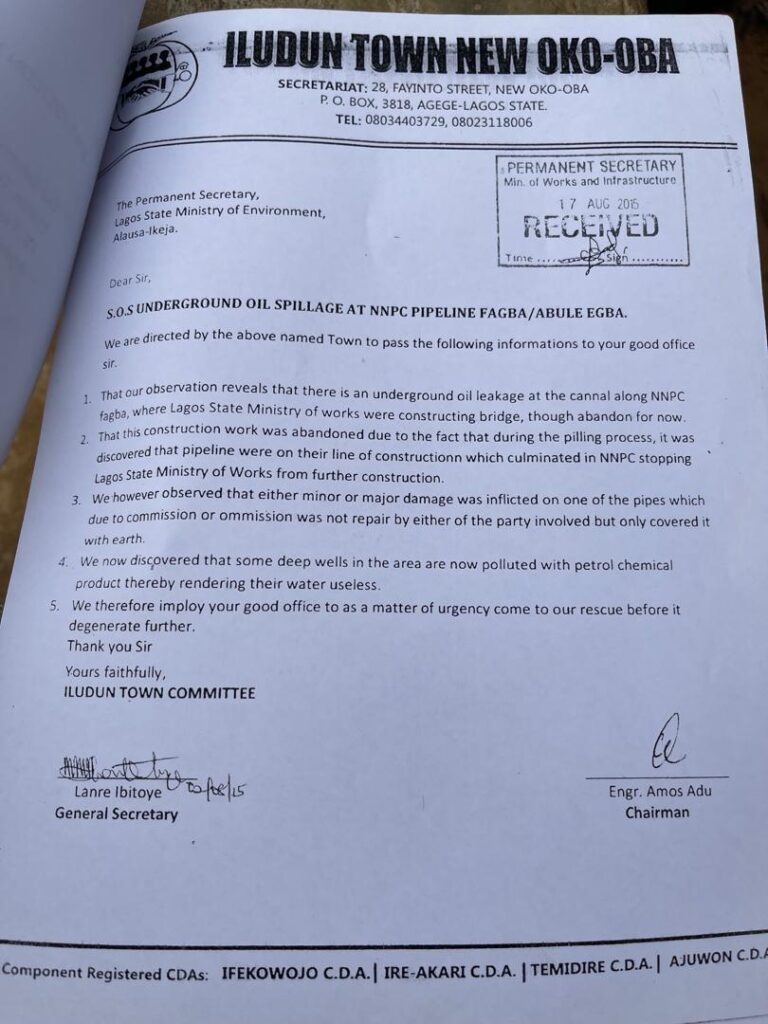
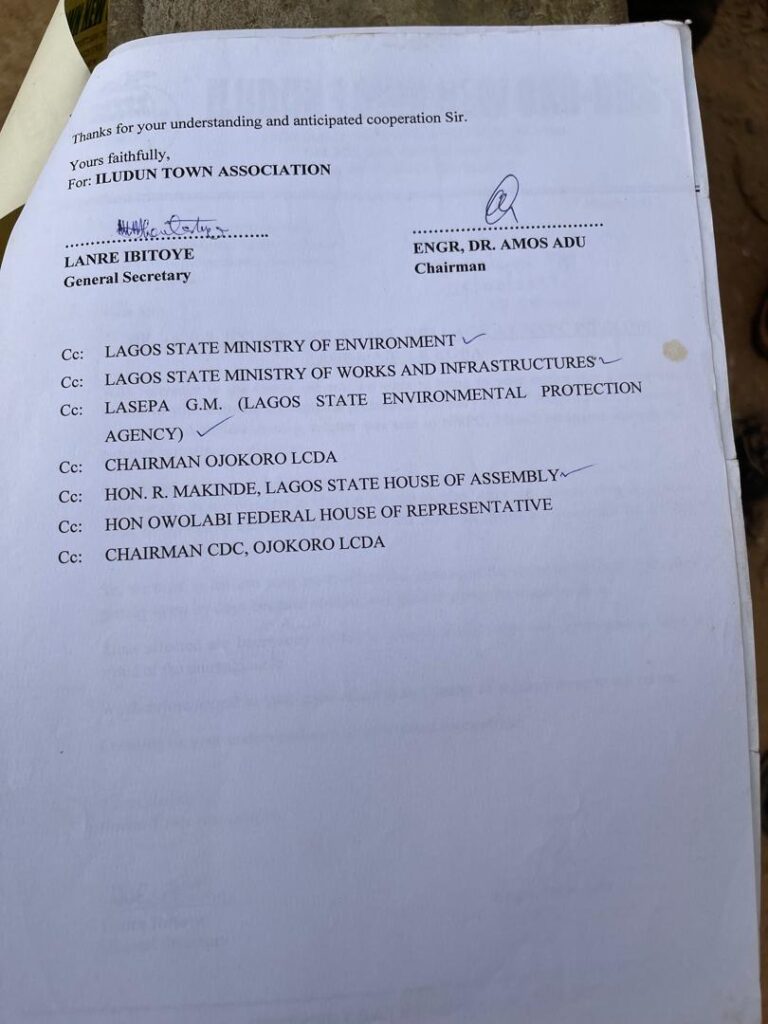
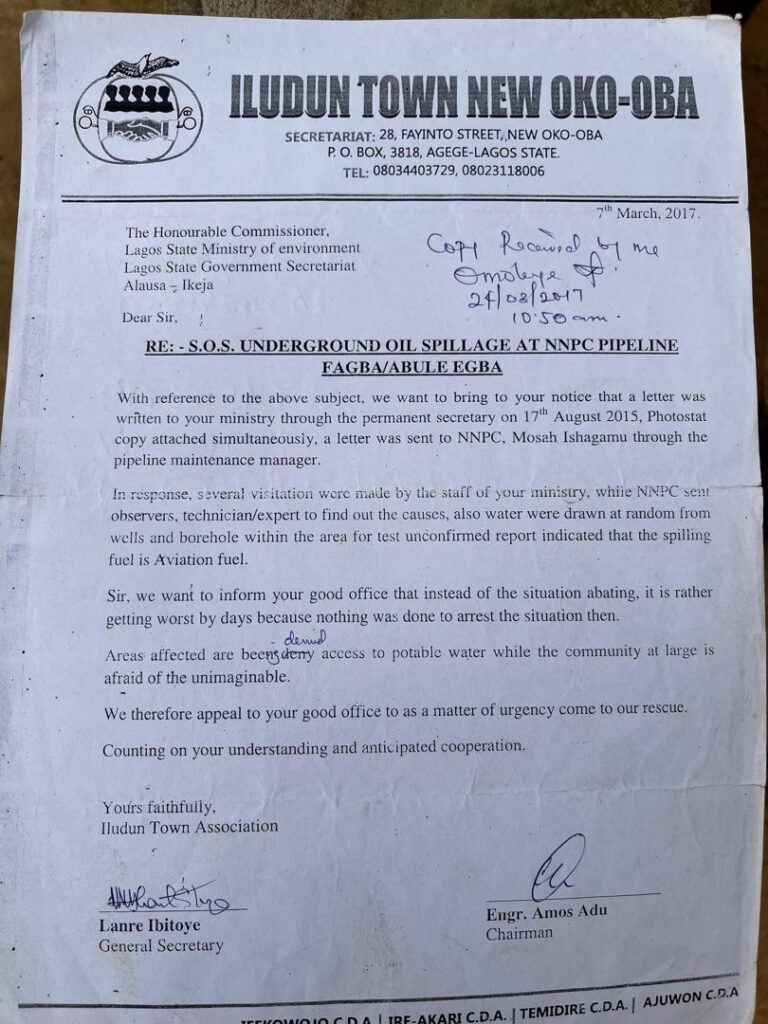
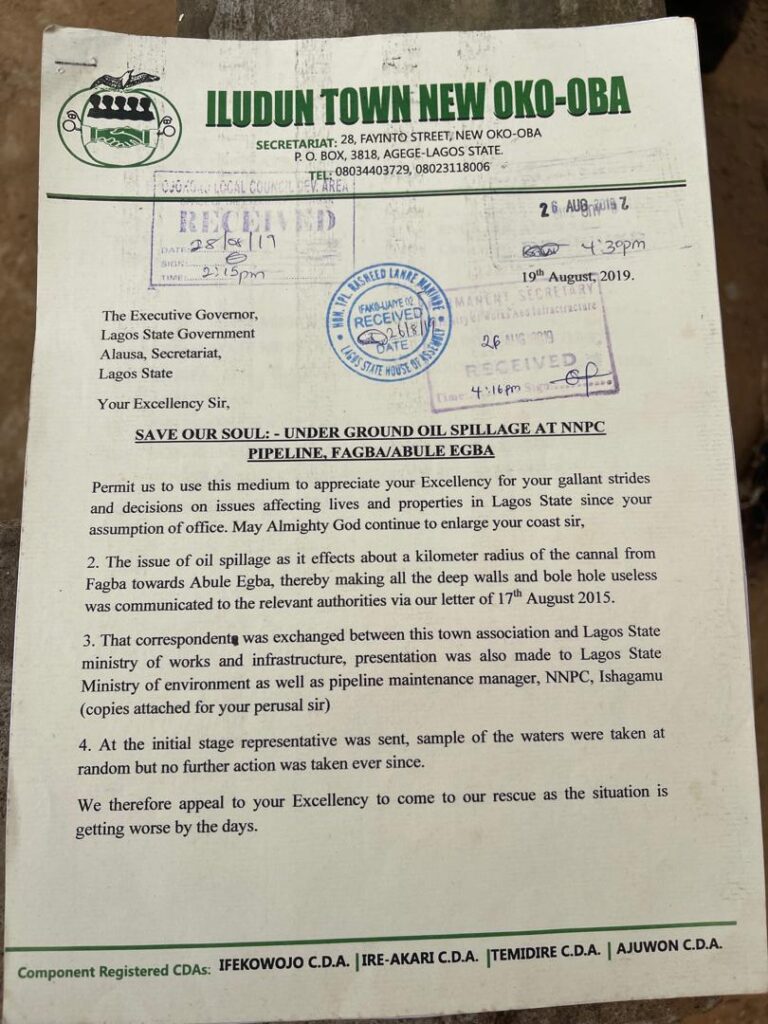
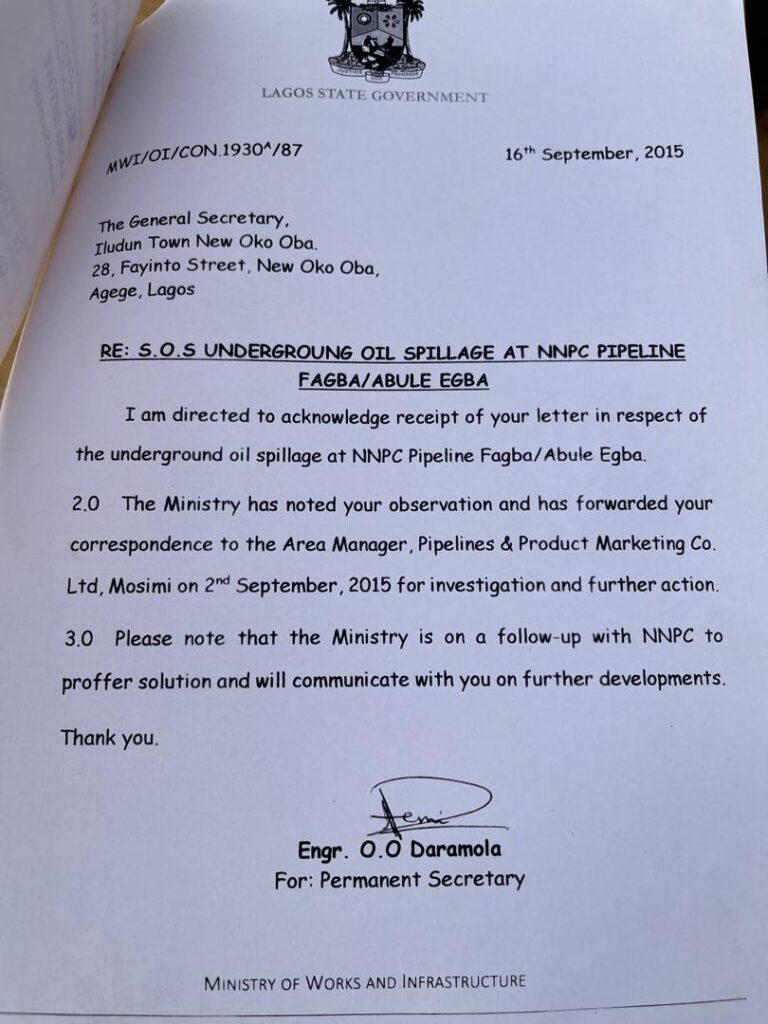
He said the commmunity wrote to Nigerian National Petroleum Company, (NNPC) and the Lagos State Government, but that they did not receive any response.
He said the former community chairman, the secretary and some elders, went to meet Government officials, and they came with a lot of promises saying they will address the problem but nothing has been done till date.
Akinwunmi Johnson, a community resident also lamented how the government has refused to supply pipe-borne water to the community, and how they have subsequently been made to resort to digging private boreholes and wells only to find out that the water has been contaminated.
Ironically, there is the Iju Waterworks, which is about 2km to the community but the community has not benefited from the Water Corporation.
“The last time Iju Waterworks supplied water to the community was around 20-25years ago. We have written to the state government but all yielded no results.
He said surprisingly, the waterworks is about 2km from the community.
Why the Iju Water supply elite residents in the area, the poor, vulnarable communities are neglected.
“Areas like Lekki, Ikoyi among many other high places get potable water from this waterworks,” he lamented.
Chief Femi Adeshina, the treasurer of the community association explained that the government wanted to expand the little bridge that connected the community to Abule-Egba, amother Lagos community, but unfortunately, that was not done.
He noted that the bridge project which activities led to the bursting of the pipe that polluted the entire water was never completed and has been abandoned.
“The construction was on the canal but at last, when they were digging the ground, because anytime rain falls, the water covers the little bridge, they messed up the water source of the community.”
He said the government wanted to build a bridge but the contractor that was given the job did not do well, in the sense that it was well known that all the area had NNPC pipelines and care should been taken to avoid damages.
He said the name of the road is also being politicise as one Igwe Azubuike which means the king of the Igbos in Lagos is also claiming the ownership of the road which makes the infrastructure on the road to be at risk of individual manipulation.
He continued “Many call it NNPC pipeline road. When the contractors came, they were digging the beams to carry it out and that was how the pipes got damaged and since then, we have been on it as a community. The only thing they did for us was to stop the contract and move the construction to another place after the damage had been done.”
Health Risk and Economic Downturn
Nigeria currently faces economic meltdown. External debt as at 2023 stood at $42b, debt service ration stood at 73%, inflation is at 32.4% amidst declining Naira value compouned by corruption in high and low places.
Experts contend that there is relationship between pollution and economy growth especially as they related to lowly healthcare budget and the impact on public health.
Water pollution has become a major environmental issue.
Though the community has to synchronised data, residents said at least an average of two people die every month from diseases some of which are related to environmental problems.
The United Nations Environmental Programme (UNEP) in 2016 noted that about 3.4 million people on the three continents die each year from diseases associated with bacteria, viruses or other microorganisms in the water. The Lagos residents are certainly some of the victims.
In 2019, the World Bank also stated that the economic growth and water pollution are intrinsically linked since water is needed for life, health, and economic production.
The result may be similar in this context as one of the traditional elders in the community who does not wish to be named told our reporter that there has been health dangers arising from increasing economic challenges that echo across Nigeria.
The economic situation in Nigeria has been to the disadvantage of the community.
A source lamented that house rent prices have drastically gone up making tenants impoverished while house owners gets poorer due to inability of many tenants to pay their house rents. The lack of access to good water makes matters even worse.
“Since the discovery of this pollution in 2015, a lot of residents with big businesses in the area have left. The pollution has forced so many lucrative companies, businesses out which should have provided job opportunities to the community youths,” one source said.
He said water services companies in the area have all left since their main raw material has been poisoned.
Andrew Nkem, a resident who has stayed in the community for 32-years, say residents face a lot of health challenges due to pollution of water, the most essential of human need.
He explained how his 3-year old kids has been severely admitted in the hospital sometimes for days.
He said he has been spending a lot of money on family health at the same time spending on water treatment and water purchase from another community.
“We have had a lot of health issues over the years. My first challenge is my second and third son who suffers frequent throat infection and other infections.
He said he always takes the children to hospital whenever they were ill.
He said one day, the doctor called him to ask if the water they drink at home was good.
He said that was when he realized the children ailments were linked to poor water sources.
“In one instance, after a series of tests, we discovered that the kids had throat infection,” he said lamenting the cost of medicare in a downcast economy.
Nkem noted how he spent so much money on his water treatment which was not still good to drink or even fair enough to bath and for laundry.
He said that he spends N700-1000 every 2-days to purchase potable water from neighboring communities,
something many poor residents could not afford.
He said he particularly uses two ways as alternate sources of water, pay the ‘Hausa’ boys to help fetch water from the neighboring communities which cost of N700-N1000 Naira every 2-days.
He said another method is treating the tanks every month or two which cost the family around twenty-four thousand Naira or more.
Sample Results & Analysis
For further analysis, our reporter took samples of the water to the laboratory for test.
The test shows the water physical, Chemical and Microbiological qualities.
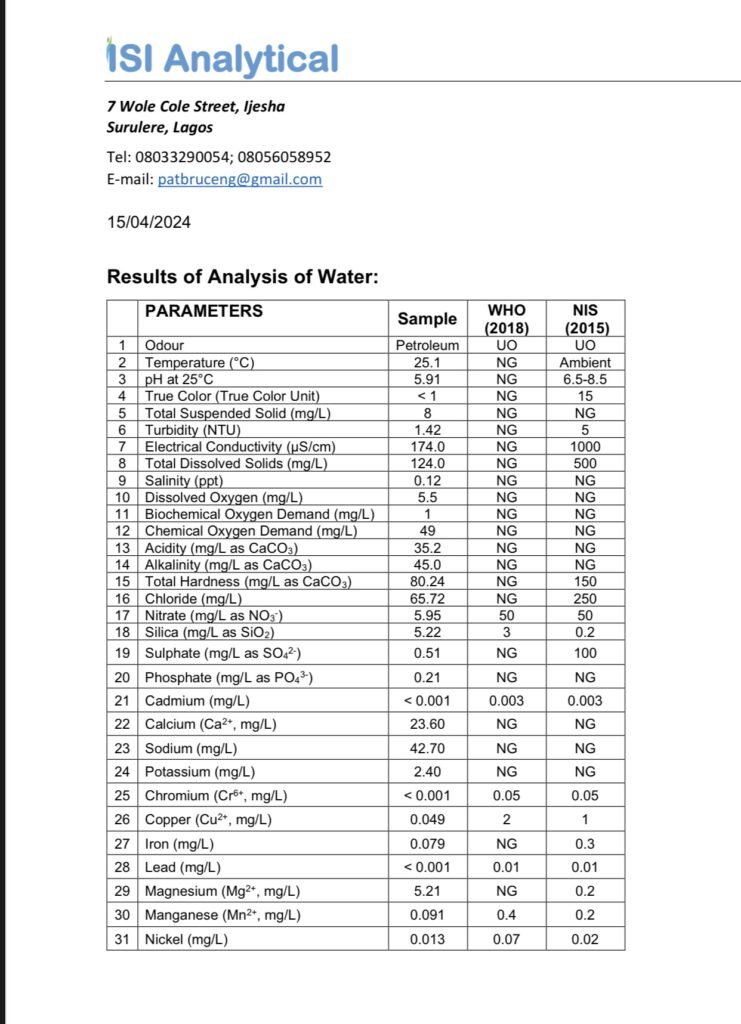
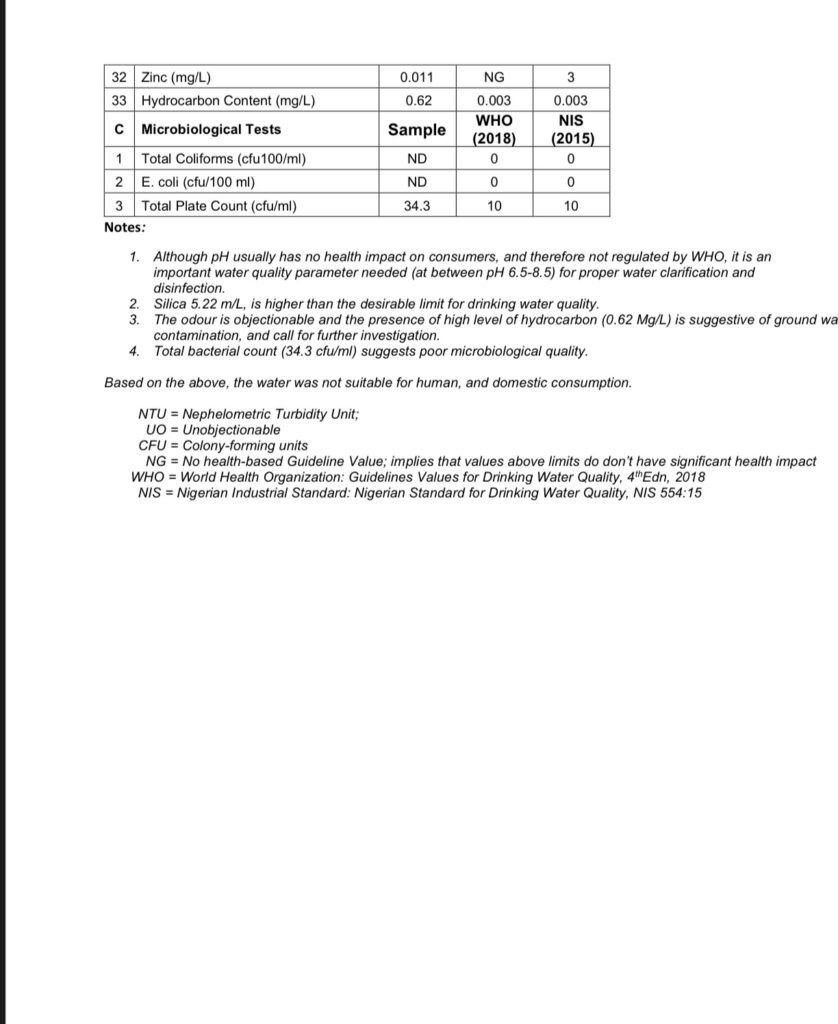
Above is the lab test result
The Methodology used;
Analytical Reagent grade chemicals were used in all tests. Except otherwise stated, all reagents used for QC procedures were from Hach Chemical Company, USA.
Reagents and certified reference standards were procured from authorised dealers: Analytical grade nitric acid, hydrochloric acid, sulphuric acid, Ethanol (AR; 99.9%) and acetone (AR), were procured from Sigma-Aldrich Co., USA.
Equipment and Supplies used includes;
- Analytical Balance (Gulfex FA 2104)
- Inductively Coupled Plasma-Optical Emission Spectrometer (Agilent ICP-OES, 710-Axial)
- Freezer, capable of maintaining 4 oC
- Lab Oven (Labnet ED 23; Labnet Scientific Services, USA)
- COD Reactor (Grant QBD 2)
- Dissolved Oxygen Meter
- Refrigerator, capable of maintaining a temperature of 4oC.
- Hot plate with variable heat settings (Labnet)
- Multi-meter for EC/TDS/Salinity/pH/mV (IONIX PC-50)
- Turbidity meter (Hach 2100Qis)
- Laboratory Oven (Labnet)
- Lab ware – All reusable lab ware (glass, Teflon, plastic, etc) were sufficiently cleaned before use.
Summary of Methods
Mild Digestion for Determination of PO43- in Water
An aliquot (50 ml) of well-mixed sample was transferred into a conical flask. To this was added 5 mL of 6M HCl, and then heated on a hot plate until the volume has been reduced to about 30 ml. The digestate was cooled and then filtered through Whatman #1 filter paper. The residue on the filter was washed with distilled water. The filtrate was quantitatively transferred to a 50 ml volumetric flask, diluted to volume with distilled water, and saved for the determination of sulphate and phosphate.
Pretreatment for Determination of Nitrate and Sulphate
A 50 ml aliquot of well-mixed sample was filtered through a 0.45µm membrane filter. The filtrate was saved for the determination of nitrate and sulphate
Where applicable, any other sample pre-treatment methods are discussed under individual methods for measurements
Table of Results
The table below shows the parameters in the water, comparing with the World Health Organization (WHO) and Nigeria Industrial Standard (NIS) of drinking quality water.
The result will further determine if the water sample meets WHO and NIS water standard for Human consumption.
Expert Analysis
Mr Onianwa Patrick, a laboratory scientist at ISI with 37 years of professional experience, who analyzed the results of the test said many of the water parameters do not meet the WHO and NIS standards. He added that the odour of the water makes it unsuitable for human and domestic consumption.
“Although pH usually has no health impact on consumers, and therefore not regulated by WHO, it is an important water quality parameter needed (at between pH 6.5-8.5) for proper water clarification and disinfection.
“Silica 5.22 m/L, is higher than the desirable limit for drinking water quality. The odour is objectionable and the presence of high level of hydrocarbon (0.62 Mg/L) is suggestive of ground wat
contamination, and call for further investigation”
“Total bacterial count (34.3 cfu/ml) suggests poor microbiological quality.
He said based on the analysis, the water was not suitable for human, and domestic consumption.
Efforts to speak to the Commissioner for Environment in Lagos did not succeed. He did not pick several calls made to him while test messages got to response nor acknowledgement.
However, a Lagos State Government officials who does not wish to be named, said the authorities would “look into the matter”, a common slogan usually employed to dismiss critical issues brought before Nigerian authorities.

